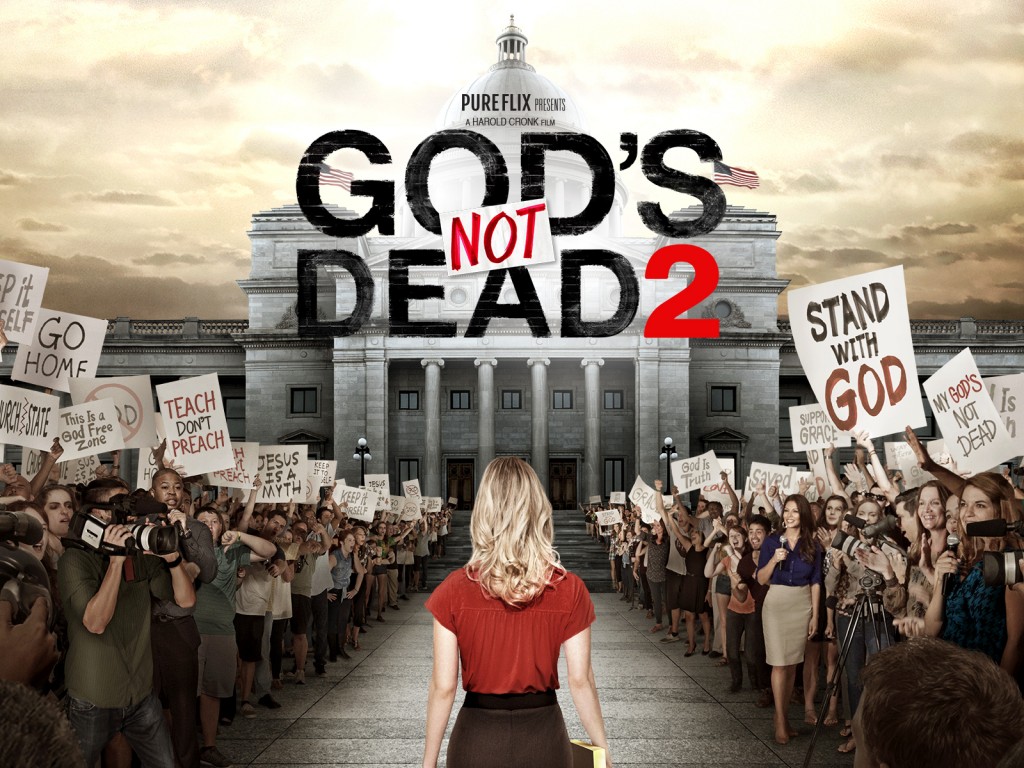CULTURE | Ben McEachen
Those who claim allegiance to Jesus and those who don’t are being united by God’s Not Dead 2, an American movie eager to fight the good fight for Christianity. However, what they are united in is the opposite of what the zealous drama intends.
Released in 2014 the original God’s Not Dead became a Christian movie smash hit. Made for not much, it made heaps at US cinemas. Focused upon a college student who challenges his professor’s atheist edicts, its earnest yet shrill depiction of attacks upon Christian faith divided viewers and critics.
The sequel is better acted, scripted and composed, while still painting any challenge to Christian expression in hysterical, one-dimensional colours. A history teacher conveniently named Grace (Melissa Joan Hart) is thrust into court for mentioning Jesus in the classroom. Other Christians also encounter threats to how they share their faith, in a movie that has the devilish prosecutor spouting venom such as “I hate [Grace] and everything she stands for.”
 God’s Not Dead 2 is crafted as a Christian response to perceived attacks upon freedom of religious expression in the Western World. Or persecution, to call it what God’s Not Dead 2 does. The script is loosely based on real events of increased antagonism towards Christian viewpoints. But in its laudable bid to spotlight a contemporary issue, God’s Not Dead 2 might have overstated its case.
God’s Not Dead 2 is crafted as a Christian response to perceived attacks upon freedom of religious expression in the Western World. Or persecution, to call it what God’s Not Dead 2 does. The script is loosely based on real events of increased antagonism towards Christian viewpoints. But in its laudable bid to spotlight a contemporary issue, God’s Not Dead 2 might have overstated its case.
Commentators on either side of the Jesus divide are unanimous in feeling God’s Not Dead 2 is extreme and unfair. Many objections have emerged about its bid to stand up for the gospel. The major one revolves around its presentation of what Christians are up against. Robertebert.com saw God’s Not Dead 2 as “filled with a sense of paranoiac persecution and seething resentment … The movie is loaded with simplistic ‘Us vs. Them’ thinking, comforting, perhaps, to those in agreement, but extremely disturbing to those not on board.
Variety’s Nick Shager puts it bluntly: “This paranoid persecution-complex fantasy is unlikely to win many converts.”
Most secular critics share this view and spend more time disputing the on-screen cries of persecution, than reconsidering their legitimacy. Even though God’s Not Dead 2 wants to preach to the choir, surely it also wants those who aren’t in the choir to listen to the tune it is singing.
The God’s Not Dead 2 team and others might rush to suggest those who don’t live for Jesus are unlikely to listen to or acknowledge any social hurdles faced by Christians. That may be true but Christian reviewers also are having similar troubles with God’s Not Dead 2.
Christianity Today’s chief critic Alissa Wilkinson felt uneasy about the gung-ho portrait of American persecution, in light of how Christians are persecuted in other countries. Crosswalk summarised the sequel as “a story of entirely one-dimensional characters: persecuted Christian heroes against crusading anti-God lawyers who squarely fit evangelical stereotypes”. Chris Williams at Patheos felt any of the better elements of God’s Not Dead 2 were “hampered by the same persecution complex” as the original.
The unintended alliance of reviewers exemplifies a key danger involved with using film as a foghorn for broadcasting the good news. While the rewards might be tremendous for God’s kingdom, the risk is viewers might tune out to the intense noise you’re making.
Email This Story
Why not send this to a friend?




